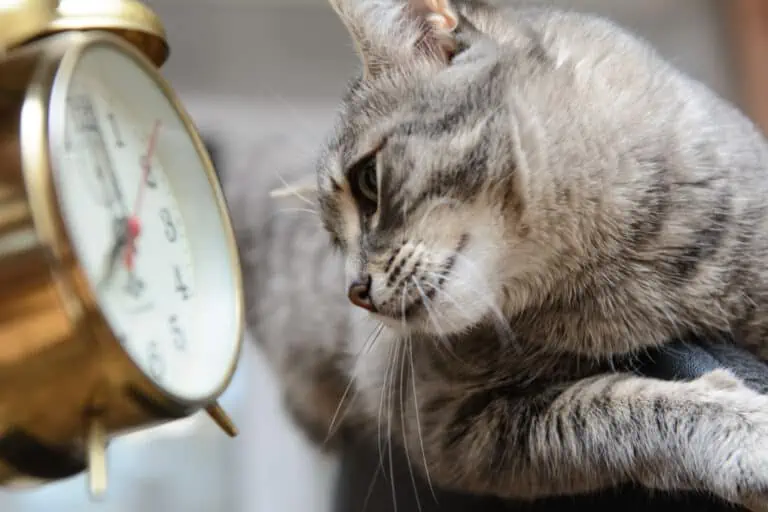-
Shop By Age
-
Kitten
Up to 1 year
-
Adult
1-6 years

How can my cat ‘tell the time’?
A cat’s day might run like clockwork: eat, sleep, drink, repeat. But that doesn’t necessarily mean that pet parents can set their watch by them. Kitties are creatures of habit, with daily routines that are quite rigid and repetitive.
01/03/2024
A cat’s day might run like clockwork: eat, sleep, drink, repeat.
But that doesn’t necessarily mean that pet parents can set their watch by them.
Kitties are creatures of habit, with daily routines that are quite rigid and repetitive.
They’ll snack when hunger strikes, slumber when tiredness kicks in, and explore when they’re feeling adventurous.
While it’s possible for them to identify the time of day by association – perhaps when their human companion gets up in the morning, or returns from work – you certainly won’t catch them clock-watching at any point in order to ensure that they’re sticking to their schedule.

What ways can cats ‘tell the time’?
Our pets might be peculiarly punctual, but the hands of time mean very little to them.
Though they can likely differentiate between morning, noon and night, they’re not aware of exact hours in the am or pm.
And, in all honesty, why would they need to be? It’s not as if they’re ever going to be running late for an important meeting.
There’s no pressure on them to be on time for work, get to the supermarket before it closes, or pick the kids up from school.
They’ll nap when they’re sleepy – whenever that may be – and they’ll feast when they’re hungry, which might involve giving their pet parent a nudge if their sustenance hasn’t yet been served.
They can’t tell the time by looking at a clock, or know what day or date it is by looking at a calendar, but they have a sense of time, and they sure know when a lengthy period has passed after being left alone.
The light and dark of day and night also aids their time-keeping as does routine, or familiarity, such as scheduling playtime before dinner, having snuggles, or returning home from work.
All these scenarios, should they be a regular occurrence, will help our felines build a pattern, so they can gauge what’s happening and when.
Environmental cues can also help. The postman’s arrival could be a signal, the rush of school children past your window in the morning and afternoon could be another, or a car pulling into the driveway might act as another indicator of time.
Do cats understand time in the same way that humans do?
Pet parents know how time can drag during the week.
Work commitments and other laborious chores tend to make the days feel longer.
Every second of every minute of every hour is felt before we’re able to clock off.
But, as the popular saying goes, time also flies when you’re having fun.
The weekend seems to be over before it has even begun and the concept of time conspires to work in reverse.
Hours seem like minutes, and minutes pass like seconds, and suddenly you’re back in work.
This paradigm doesn’t really come into play for kitties, as their days tend to mirror each other.
They don’t have appointments to schedule, they don’t need to routinely check their diaries, or be in a certain place at a very specific time.
While pet parents can tell the time, and every hour tends to be accounted for, our four-legged furballs simply have an inclination as to what time of day it is.
They’ll know when to awake from their slumber (as they disrupt the sleep of their human companions just moments before the alarm sounds), they’re able to estimate when it’s feeding time, and they’ll then split their day between snoozing, exploring and snuggling.
The only other way in which they are able to ‘understand’ time is when they’ve been separated from their best friend for a prolonged period of time.
You can tell you’ve been missed as soon as you walk through the door!
How important is a daily schedule for my cat?
A routine is exactly what your kitty-cat needs to help their day run like clockwork.
Your ‘purr-fect’ and particular pets will work their schedules in tandem with certain behaviours or triggers.
It might be the chorus of a songbird, the sound of an alarm, the postman rattling the letterbox, their human companion leaving for work, or returning later in the day.
It could be the droves of school children and parents that scurry past twice-a-day, the TV being switched on in the evening, or simply their bowl of food being laid down at a particular part of the day.
Cats are creatures of comfort – and habit – so they like to know what they’re doing and when, and they like to stick to a strict programme.
If your patterns change, and they will, because nobody has consistent work and sleep structures, then it’s important to try and help them keep their routine as similar as possible.
They say familiarity breeds contempt, but that couldn’t be any further from the truth for our whiskered furballs. As long as they’re able to eat, nap, explore and nap some more, then they’ll come across like the cat that got the cream.
Take the time to hone your cat’s routine
Cats actually have an incredible sense of time considering a clock is nothing but a ticking wall decoration to them.
Sometimes, however, they might need a little helping hand from us, rather than the hands that rotate on a clock face.
They need regular playtime and mealtime to help them stick to a routine while supporting and enhancing their cognitive and physical well-being.
Like us, and hundreds of other animals, exercise and mental stimulation is vital for them to stay strong, healthy and for them to continue living a happy life.
Two meals a day should suffice, with activity planned beforehand, and this can be repeated before bedtime in order to expend that final bit of energy.
Cats might give you the impression that they are independent animals, but they’re really domesticated, and rely on their pet parents for all kinds of things.
Keeping them to a routine, and ensuring that they continue to smile on the inside and out, will help them lead a happy life at home.







